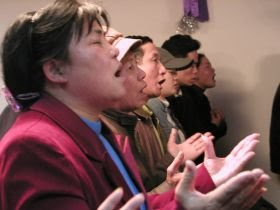Unit 3 Lesson 1

In lieu of Franklin Graham's recent visit to Beijing, I thought it would be interesting to explore Christianity in China. Graham is taking a very politically correct role and so far seems to be side stepping the recent Chinese government crackdown on Christians. In his introductory comments he stated that, “The government of China is recognizing more and more that religious freedom is important and is seeing the value of personal faith.” While it would be nice to believe that the government has mellowed, their recent actions make it clear that that is not the case.
What Graham failed to mention is that the Chinese government still considers Christianity to be illegal and as recently as May 2nd police raided a gathering of about 40 church members. China also enforces a ban on missionary work of any kind and dozens of foreign missionaries are finding their visas revoked. Of the millions of Christians in China only about 20% are members of the government sanctioned Church. (Graham is scheduled to speak at one of these churches on Sunday.) The other 80% attend unregistered and/or unofficial churches and it is those churches that are experiencing the crackdown. “They don’t actually have permission from the government to meet together, so their activities are illegal and they can be arrested, they can serve time in prison, their meetings can be broken up because they don’t have that official government seal of approval on their meetings.” According to the China Aid Association, the number of reported cases of persecution of house churches is up over 30% from the same time last year.
Graham’s visit is coinciding with an increase in the government crackdown of house churches. Many feel that the CCP is trying to rid the country of any potential troublemakers before this summer’s Olympic games. Rather than address this problem and perhaps begin a discussion with the Chinese government, Graham is actively discouraging Chinese Christians from rising up and demonstrating against restrictive laws. Instead he told Christians that they “must obey the law as they work with authorities to resolve these areas of misunderstanding or where there is tension.” He continued, “I’m not here to condemn, I’m here to work with them and help to build better bridges of understanding between Christians and government.” (Los Angeles Times May 8, 2008). Such statements seem to demonstrate a naivety and or ignorance of what it means to live on the margins of a restrictive society. His comments suggesting ‘dialoguing’ between the two parties further this impression.
http://www.bpsports.net/bpsports.asp?ID=5798







 China is everywhere in the news and not just because I am taking a class on modern China and, therefore, more aware of it. The Olympics have pushed China onto the world stage and now everyone has an opinion as to whether or not the country belongs there. But what does China think? How does China feel about being the center of attention? The latest issue of The Economist features this snarling dragon in its cover with the title "Angry China". The introductory article offers a fascinating look at the problems China faces as it walks onto the world stage.
China is everywhere in the news and not just because I am taking a class on modern China and, therefore, more aware of it. The Olympics have pushed China onto the world stage and now everyone has an opinion as to whether or not the country belongs there. But what does China think? How does China feel about being the center of attention? The latest issue of The Economist features this snarling dragon in its cover with the title "Angry China". The introductory article offers a fascinating look at the problems China faces as it walks onto the world stage.